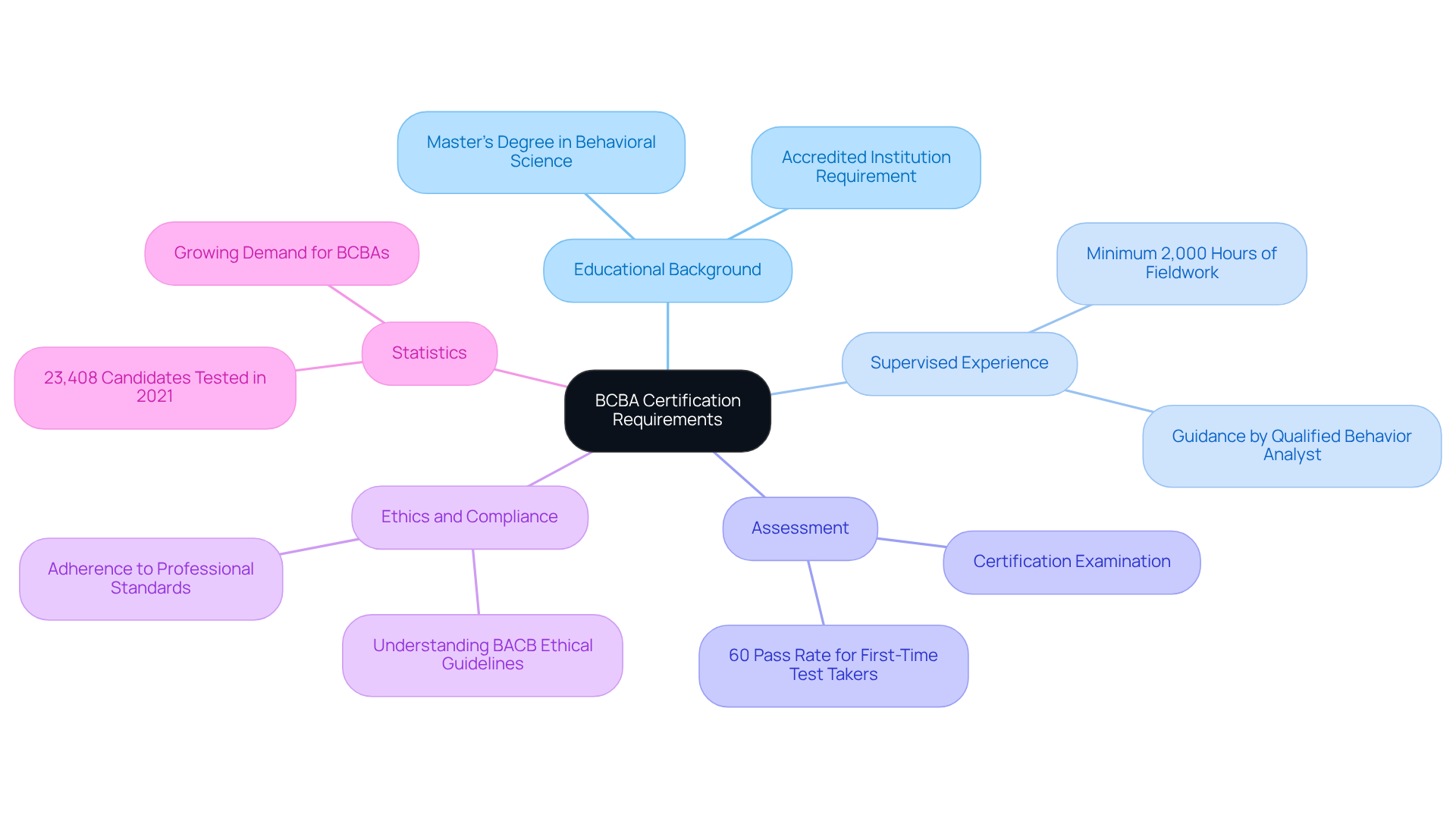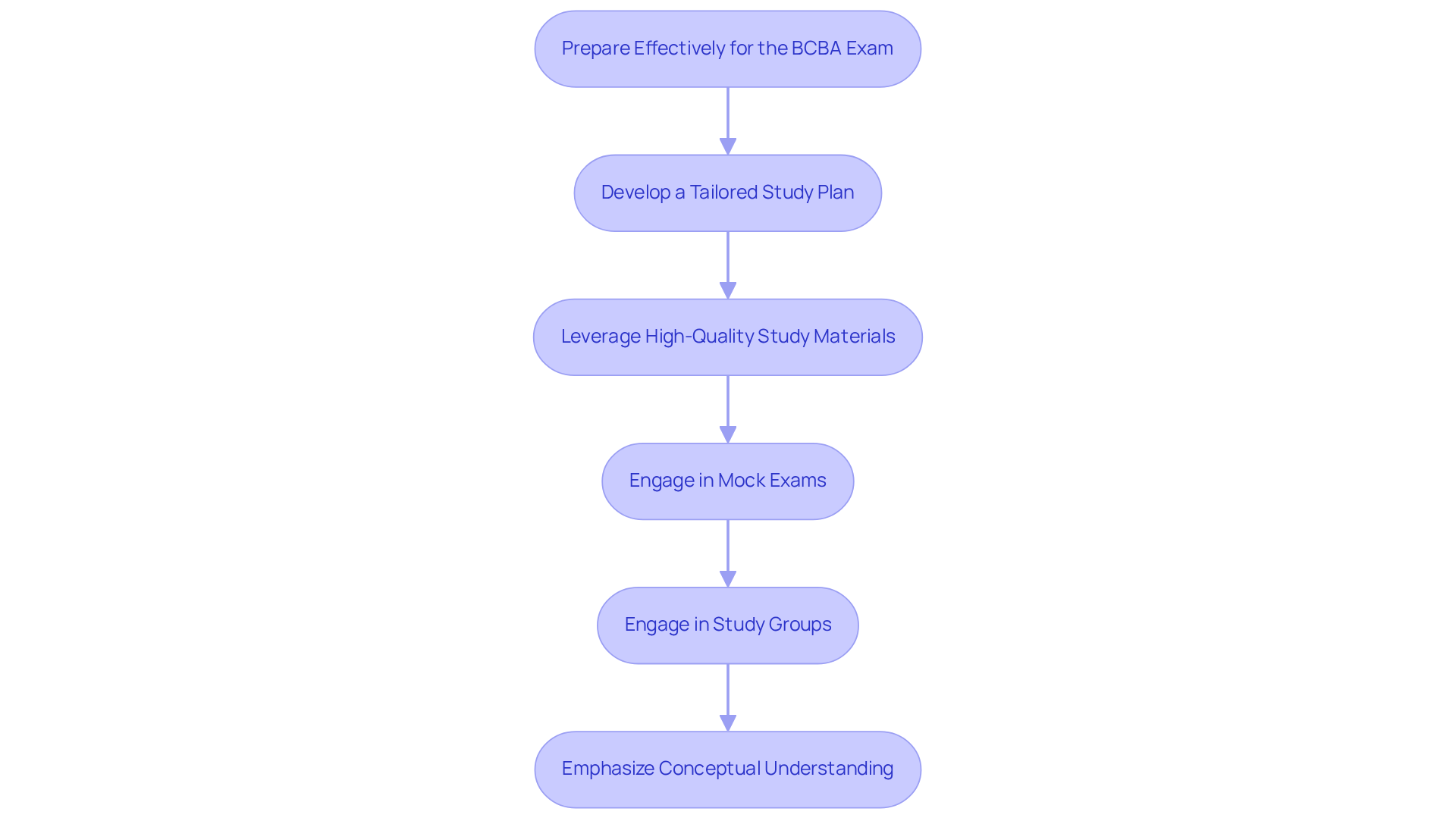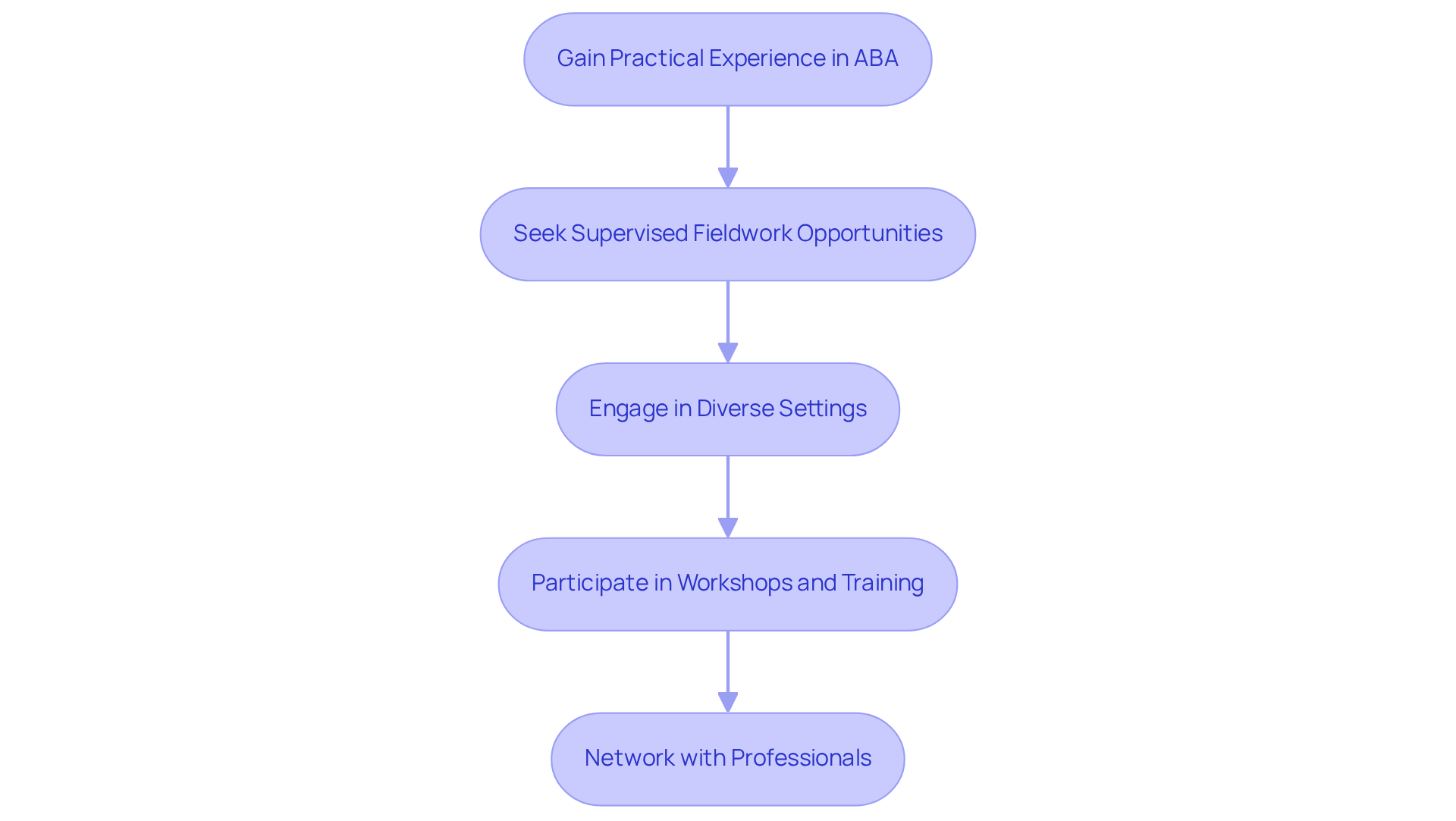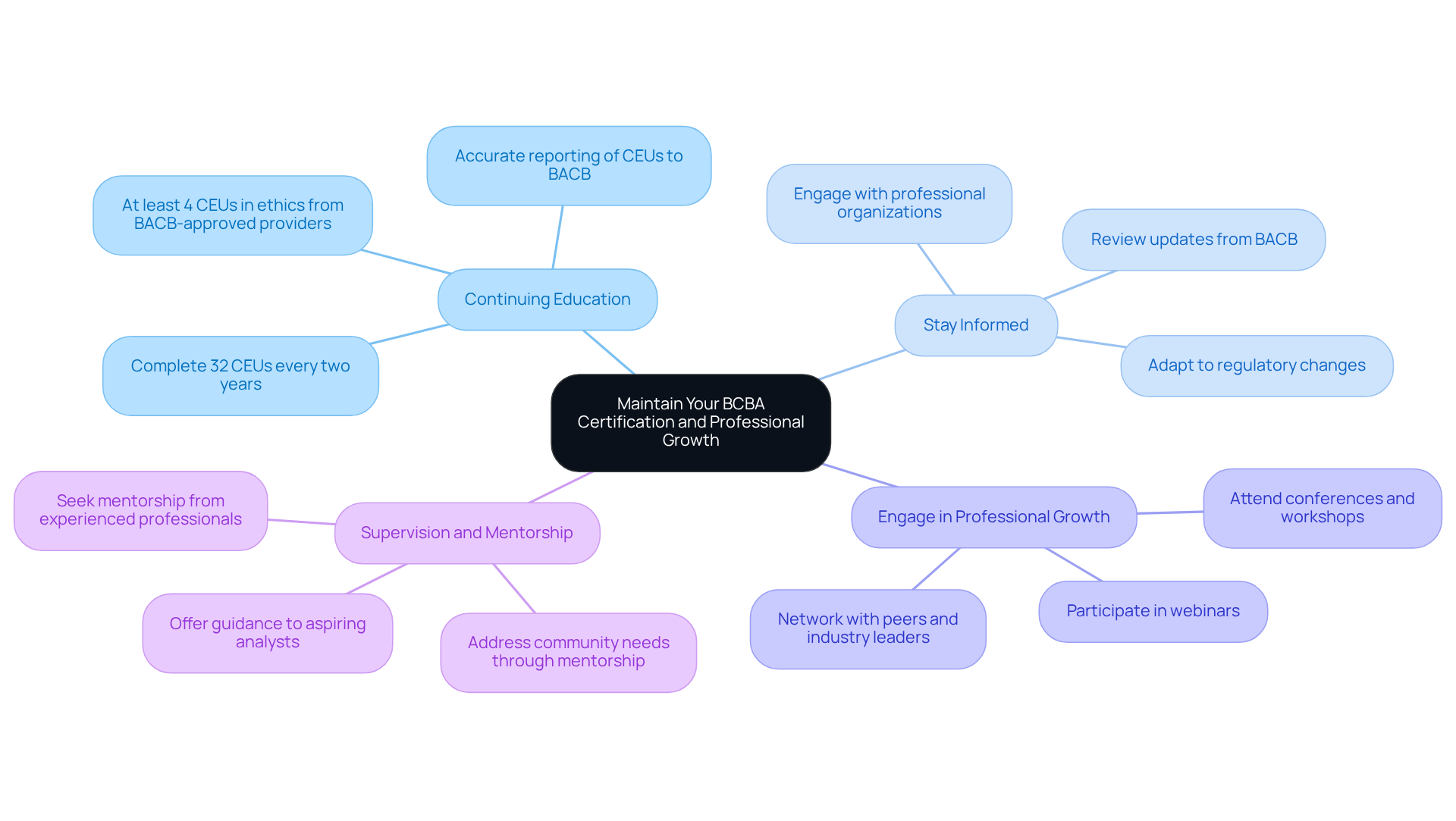September 9, 2025

Achieving BCBA certification is a crucial step for those looking to excel in the field of behavior analysis. The essential steps include:
These requirements are not just formalities; they are foundational to establishing your credibility and expertise in this growing field.
Moreover, strategic preparation is key. Emphasizing the importance of practical experience and continuous professional development can significantly enhance your success. Consider how the right resources can streamline your journey to certification. Are you aware of the best practices that can bolster your preparation? Reflect on your current strategy and how it aligns with industry standards.
In conclusion, pursuing BCBA certification is not merely about meeting requirements; it is about committing to excellence in behavior analysis. Leverage the insights provided to navigate this path effectively and position yourself as a leader in the field.
The increasing demand for Board Certified Behavior Analysts (BCBAs) underscores the vital role these professionals fulfill in tackling behavioral challenges, particularly within the realm of autism spectrum disorders.
As aspiring candidates embark on the intricate journey toward certification, grasping the essential steps—ranging from educational prerequisites to effective exam preparation—becomes crucial.
Notably, with a pass rate of merely 60% for first-time test takers, the path to becoming a BCBA is laden with obstacles.
What strategies can candidates adopt to not only satisfy the certification criteria but also thrive in their professional endeavors?
The demand for Board Certified Behavior Analysts (BCBAs) is on the rise, which is driving interest in BCBA online programs to meet the critical need for qualified professionals in the field of behavioral science. To attain the BCBA designation, candidates must meet several essential criteria established by the Behavior Analyst Certification Board (BACB). These include:
In 2021, approximately 23,408 candidates attempted the BCBA certification, with a pass rate of 60% for first-time test takers. This statistic underscores the rigorous nature of the examination and the commitment required to succeed. Effective routes to certification, such as BCBA online programs, frequently require strategic planning and dedication to fulfilling these criteria, ensuring candidates are well-prepared to create a positive influence in the area of behavioral science.
As noted in the case study "The Growing Demand for BCBAs," the increasing prevalence of autism spectrum disorder highlights the pivotal role BCBAs play in early intervention. This further emphasizes the importance of obtaining certification. As of 2025, the BACB continues to update its certification processes, reflecting the evolving landscape of behavior analysis and the increasing demand for qualified professionals. Are you ready to navigate the challenges of hiring BCBAs? Consider how platforms like Hire ABA can streamline your recruitment process and connect you with top talent in this essential field.

Preparing for the certification exam necessitates a well-structured strategy. Here are key steps to optimize your preparation:
Consider using digital tools like Anki or Quizlet for spaced repetition, which can significantly enhance long-term retention of information in a bcba online course. Remember to take regular breaks to avoid burnout, as maintaining your mental well-being is crucial for effective studying.
By applying these strategies, candidates can boost their confidence and skills, greatly increasing their likelihood of passing the certification exam on their initial try. As Benjamin Spock wisely stated, 'Trust yourself; you know more than you think you do.

Practical experience is essential for aspiring BCBA online professionals, serving as a foundation for their future success. In a rapidly growing field like ABA therapy, the demand for BCBA online professionals is projected to increase by 25% over the next five years. To gain valuable experience, consider these key steps:
Seek Supervised Fieldwork Opportunities: Pursue internships or positions that provide supervised fieldwork under a qualified BCBA. This experience is vital for fulfilling certification requirements in the BCBA online program, as candidates must complete either 2,000 hours of supervised fieldwork or 1,500 hours in a concentrated pathway.
Engage in Diverse Settings: Broaden your understanding by gaining experience in various environments, such as schools, clinics, and community organizations. This exposure allows candidates to work with different populations and address a range of behavioral challenges, enhancing their adaptability and skill set.
Participate in Workshops and Training: Attend workshops and training sessions to deepen your knowledge and refine your skills in specific areas of behavior analysis. Continuous education, including options like BCBA online, is crucial for staying updated with the latest practices and methodologies in the field, especially as new opportunities emerge in leadership and remote roles.
Network with Professionals: Cultivate relationships with seasoned behavior analysts and other experts in the field. Networking can lead to mentorship opportunities, job referrals, and insights into best practices, significantly enhancing your career trajectory in a booming market.
By actively seeking practical experience, candidates can cultivate the skills essential to thrive in their future positions as behavior analysts. This proactive approach ultimately contributes to meeting the increasing demand for qualified professionals in the domain of Applied Behavior Analysis.

To maintain BCBA certification and foster professional growth, BCBAs must concentrate on several key areas:
Continuing Education: Complete a minimum of 32 continuing education units (CEUs) every two years. Ensure that at least 4 of these units focus on ethics and are sourced from BACB-approved providers. Accurate reporting of CEUs to the BACB is crucial, underscoring a commitment to ethical practice and professional excellence.
Stay Informed: Regularly review updates from the Behavior Analyst Certification Board (BACB) and engage with professional organizations. Staying informed about regulatory changes and optimal methods is essential for adapting to the evolving landscape of conduct assessment. The increasing demand for skilled analysts across various sectors, including education and healthcare, highlights the necessity for ongoing education.
Engage in Professional Growth: Attend conferences, workshops, and webinars to enhance skills and understanding in behavioral studies. These opportunities not only provide valuable insights but also facilitate networking with peers and industry leaders.
Engage in Supervision and Mentorship: Consider offering guidance to aspiring behavior analysts or seeking mentorship from seasoned professionals. This reciprocal relationship promotes growth and advancement, enhancing the practice of behavioral study. The projected growth of BACB certificants in states like Georgia and Nebraska underscores the significance of these efforts in addressing community needs.
By dedicating themselves to continual education and professional growth through BCBA online programs, BCBAs can ensure they remain skilled and effective in their practice, ultimately benefiting their clients and the broader field of analysis. As Laura NG, Clinical Operations Manager, states, "The demand for skilled behavior analysts is particularly pronounced in states like Georgia and Nebraska, where the need for autism services has witnessed a surge.

The journey to becoming a Board Certified Behavior Analyst (BCBA) is not only challenging but also immensely rewarding, underscoring the vital role these professionals play in addressing behavioral issues, particularly within autism spectrum disorders. With the demand for qualified BCBAs on the rise, understanding the certification requirements, effective preparation strategies, and the significance of practical experience is essential for candidates aspiring to succeed in this competitive field.
Key steps in this journey are outlined, beginning with:
Effective study strategies, such as:
are crucial for enhancing exam readiness. Furthermore, the emphasis on continuous professional development through ongoing education and networking highlights the commitment required to maintain certification and excel in this field.
As aspiring candidates consider their path, they are encouraged to take proactive steps in their preparation and professional journey. By leveraging available resources, seeking practical experiences, and committing to lifelong learning, individuals can not only achieve certification but also make a significant impact in the realm of behavioral analysis. Embracing these strategies will ensure that the next generation of BCBAs is well-equipped to meet the evolving needs of the communities they serve.
What are the main requirements to obtain BCBA certification?
To obtain BCBA certification, candidates must have a master’s degree or higher in behavioral science, education, or psychology from an accredited institution, complete a minimum of 2,000 hours of supervised fieldwork, pass the certification examination, and have a thorough understanding of the BACB's ethical guidelines.
How much supervised experience is required for BCBA certification?
Candidates must complete a minimum of 2,000 hours of supervised fieldwork under the guidance of a qualified behavior analyst.
What is the pass rate for first-time test takers of the BCBA certification examination?
The pass rate for first-time test takers of the BCBA certification examination is approximately 60%.
Why is BCBA certification important in the field of behavioral science?
BCBA certification is important because it ensures that professionals have the necessary education, experience, and ethical understanding to effectively contribute to the field, particularly in areas such as early intervention for autism spectrum disorder.
What is the significance of the increasing demand for BCBAs?
The increasing demand for BCBAs is driven by the rising prevalence of autism spectrum disorder, highlighting the essential role BCBAs play in providing early intervention services.
How is the BCBA certification process evolving?
The BACB continues to update its certification processes to reflect the evolving landscape of behavior analysis and the increasing demand for qualified professionals, with changes expected as of 2025.
Our expert recruitment strategies and AI-driven sourcing ensure that you receive top-notch candidates quickly, without compromising on quality. Whether you’re looking for BCBAs, Clinical Directors, or RBTs, we’ve got you covered.